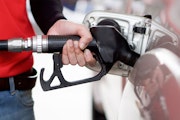Fuel Consumption Monitoring Systems for Your Fleet
Poor fuel economy can impact productivity and have a negative impact on the bottom line. This is why fuel consumption...
Read more
There are some serious implications of engine idling when it comes to fuel efficiency. Excessive motor vehicle idling leads to increased fuel consumption which not only increases wear on engine components and shortens vehicle life, but also negatively impacts the environment. Fortunately, there are ways to reduce unproductive engine idling. In this article we’ll discuss why idling engines can cost you a lot and are bad for the environment, and some potential solutions for fleet managers.
“Idling” refers to running a vehicle’s engine when it’s not moving, such as when you’re at a red light, stuck in traffic or parked at a spot. Idling is a part of driving and is a fairly common occurrence for most drivers. However, idling may not be the best thing for your vehicle, fuel consumption, or the environment.
Reducing the amount of time vehicles are idling is a simple way to maintain and even increase fuel economy among fleet vehicles, especially as fuel prices continue to rise.
Letting a vehicle idle does more damage to the engine than starting and stopping. In fact, running an engine at low speed (idling) causes twice the wear on internal parts compared to driving at regular speeds.
“Excessive idling has a negative effect on the engine and exhaust system and increases maintenance costs.” “For instance, extended idle operation may lead to reduced efficiency of engine lubricants (increase in frequency of oil change), engine or spark plug wear/fouling and accumulation of fuel residue in the exhaust system”.
Excessive idling can also cause a build-up of carbon residue in a truck’s engine. Because the engine is not operating at its optimal temperature when idling, fuel is only partially combusted, leading to fuel residue build-up on the cylinder walls. This can further damage engine components, including spark plugs and exhaust systems, increasing maintenance costs and shortening the life of the engine.
Does idling waste fuel? Yes, it does. Idling vehicles can use more fuel than you might realise. This directly affects how much you spend on gas and how often you need to refuel. How much fuel a vehicle consumes while idling depends on factors such as its, weight, engine size, and the type of fuel it uses. “Idling can use up to 2 litres of fuel per hour, emitting over 5.26kg of CO2”.
Some countries even have anti-idling laws that restrict engine idling and impose fines on drivers who violate them like the UK, France and Germany.
Download this free guide to find out effective ways to bring down fuel costs.
Idling and wasting fuel have a serious impact on the environment. The World Health Organization estimates that air pollution is responsible for 4.2 million deaths each year. Particulate matter (PM) is made up of solid and liquid particles in the air, both from natural and man-made sources. When PM is inhaled, it can cause health problems. In New Zealand, these health problems associated with PM range from respiratory irritation, heart problems, lung cancer, and even premature death.
In Australia, a report on Transport Energy/Emission Research recently found that “passenger vehicles are likely idle more than 20 percent of their drive time. The report found that engine idling contributes up to 8 per cent of total carbon dioxide emissions over the journey, depending on the vehicle type. To put that into perspective, removing idling from the journey would be like removing up to 320,000 cars from New Zealand roads”.
For many people, reducing excessive idling is a priority, if not a necessity. For instance, though everyone can benefit from fewer idling vehicles on the road, business owners who have to manage their fleet of vehicles stand to save money by reducing idling time.
Engine idling may seem harmless, but it actually has tremendous impacts that can negatively affect everyone. It wastes a significant amount of money on fuel and puts harmful toxins into the environment. Keep engine idling at the forefront of your mind when driving so that you can do your part to reduce it.
Find out how our platform gives you the visibility you need to get more done
Tags: Cost Control, Field Management, Inspections, Performance & Coaching, Revenue & ROI, Vehicle Maintenance



Find out how our platform gives you the visibility you need to get more done.
Poor fuel economy can impact productivity and have a negative impact on the bottom line. This is why fuel consumption...
Read moreFuel makes up a major portion of fleet expenses. Finding ways to become more fuel-efficient should be a focus for businesses...
Read moreAs a fleet owner, your day-to-day costs can quickly add up. What you don’t know is there are further hidden, expensive...
Read moreTips on Using Telematics to Reduce Fuel Costs
Read more